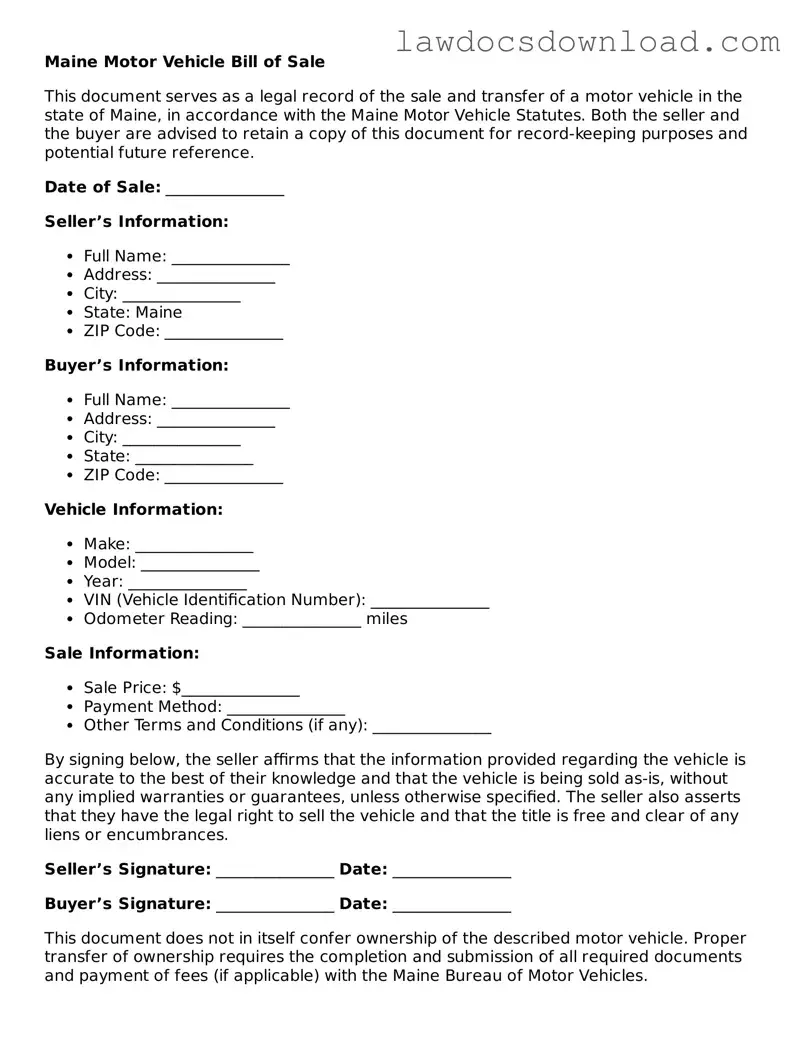The Maine Motor Vehicle Bill of Sale form shares similarities with a Warranty Deed. Like a bill of sale, a warranty deed is a legal document that transfers ownership, but in this case, it's used for real estate transactions. Both documents serve to legally protect the buyer, by guaranteeing that the seller holds clear title to the property, whether it's a vehicle or real estate, and that they have the right to sell it.
Another document similar to the Maine Motor Vehicle Bill of Sale form is a Receipt of Sale. Both serve as proof of a transaction between a buyer and a seller. However, a bill of sale typically includes more detailed information, such as the VIN (Vehicle Identification Number), make, model, and year of the vehicle, which is not always the case with a receipt. Receipts can be used for a variety of transactions but don't always provide the legal protections or specific details of a bill of sale.
A Promissory Note is also related in its function to the Maine Motor Vehicle Bill of Sale. It outlines the agreement between a buyer and seller regarding the payment plan for a purchase. While a bill of sale confirms that a transaction has occurred and transfers ownership, a promissory note details the buyer's promise to pay the seller over time, specifying the amount and terms of repayment. Both are critical in transactions where immediate full payment isn't made.
The document has similarities with a Lease Agreement as well. A lease agreement transfers the right to use property or equipment to the lessee for a specific period, while a Maine Motor Vehicle Bill of Sale transfers outright ownership. Despite this difference, both documents detail the terms under which the transfer occurs, including identification of the parties, the effective date, and other conditions of the transfer.
Another closely related document is a Mechanic's Lien. This is a legal claim against a property for unpaid construction work or supplies. While a bill of sale transfers ownership of property (like a vehicle), a mechanic's lien is used by a contractor or supplier as security for the debt incurred by the property owner. Both documents are involved in the legal process of ownership and rights to property but serve different purposes in financial transactions and protections.
A Gift Affidavit is akin to the Maine Motor Vehicle Bill of Sale in cases where a vehicle is given as a gift rather than sold. Both documents provide a legal record of the transfer of property from one party to another. However, a gift affidavit specifically states that the item is given without any consideration (payment) expected or received, which differentiates it from a bill of sale, where consideration is a key part.
Finally, a Title Certificate is another document similar to a bill of sale. A title certificate is the official record of ownership for a vehicle or property, issued by a governmental authority. While the Maine Motor Vehicle Bill of Sale is a document that supports the process of transferring ownership, the title certificate is the ultimate proof of who legally owns the property. Both are essential in the buying and selling process, ensuring the transaction is recognized legally.

